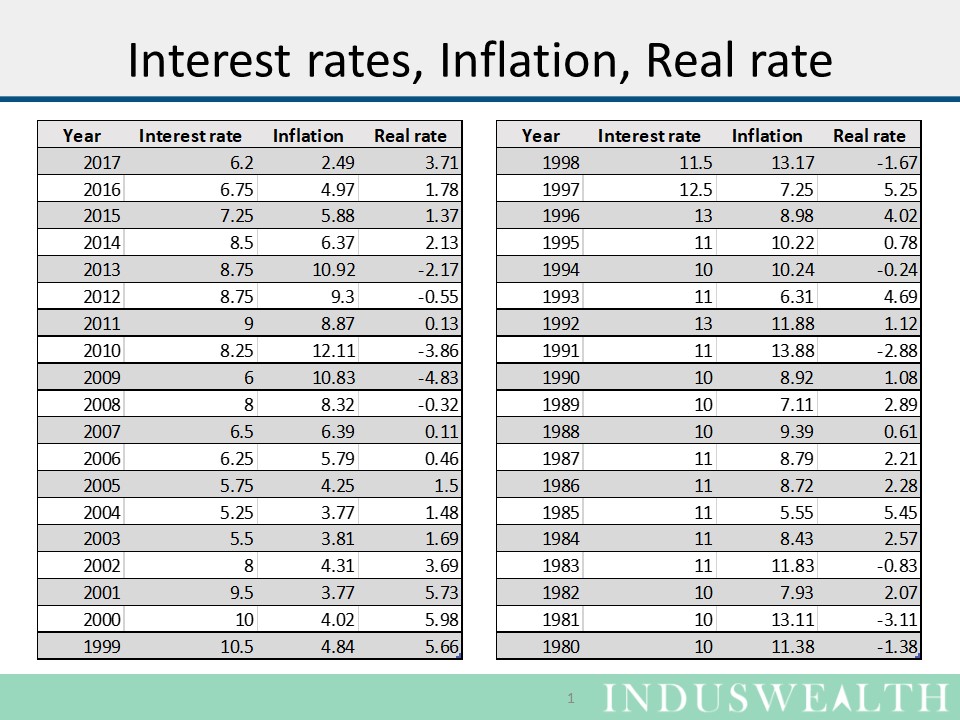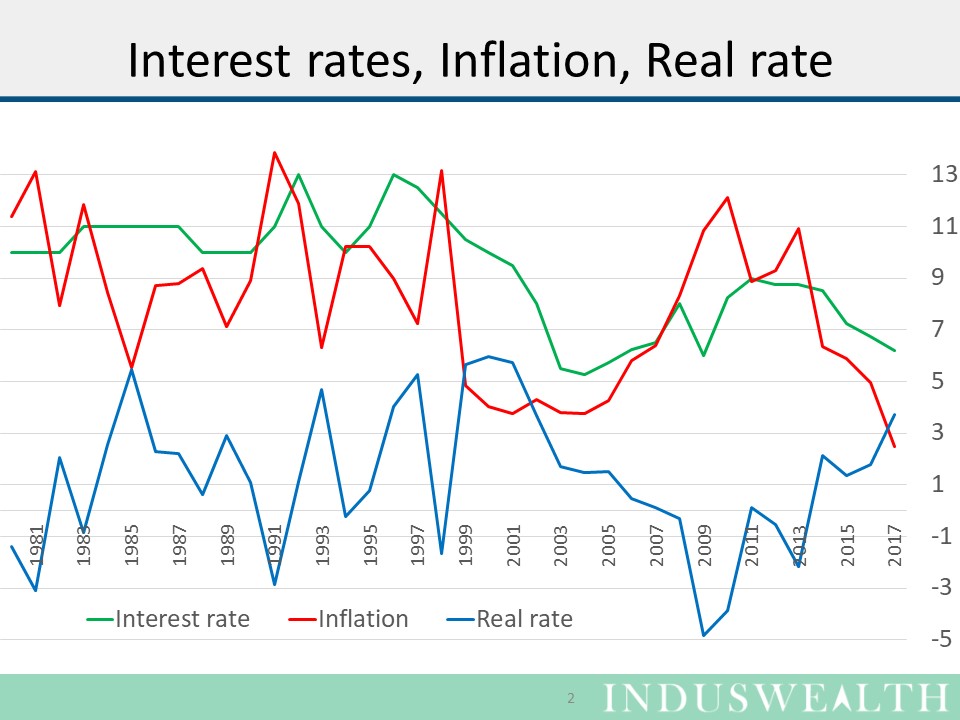Recently a lot of people have approached me to say they are unhappy with the decreasing interest rates and would like to invest in alternate options that give better returns. Most felt that they should consider stocks as they felt that that was a lot better option as the market was doing well. After witnessing recent volatility in market some people are feeling that stocks are much riskier than they believed.
We thought lets look at the data and see if the feelings are based on facts..
People putting their money in a bank should be concerned about the return they are getting. A silent “killer” for the bank interest is inflation. People putting their money in a bank should be interested in the real return, the amount by which the interest rate exceeds the inflation rate.
We looked up data since 1980 for interest rates and inflation.
The data clearly points out that though the bank interest rates have fallen, real rate realized by depositors has actually gone up. People were happy to keep the money in the bank when the real rates were poor and are moving out when the banks are paying better real rates!!!
If we look at the decision to consider equites as an investment option.
It has been established by research that equities over a long run give returns that are superior to most (if not all) other products. Equities are inherently volatile, if there was another product which gave the same returns as equites and had less volatility then people would automatically flock there. As people inherently do not like volatility, equities have to offer a better return than other products to attract investments. People must understand that volatility is the reason for superior return from equity. If equities were less volatile, then the associated returns would be lower.
It is important to remember that “Superior returns experienced over a long term in equities is because of their volatility and not despite the volatility”.
Most people who rush to the market when it is booming don’t really analyze the volatility or have a consideration of the holding period required to realize the returns. They just feel that once they invest, the universe should conspire to multiply their money right away. And when this doesn’t happen (or happen often enough), they are very disappointed and stay away from equities.
People invest in real-estate taking up large debt with a belief/feeling that it is a safe bet. Most don’t spend the time to understand that the interest component itself doubles their cost, thus reducing their potential return significantly. There is enough evidence, like low rental yields that point out that it is not a great investment. If the property was in demand (which will cause the prices to go up) then rental yields should be higher. But investments pour into real-estate based on the belief that an investment in real-estate is a safe and will fetch handsome returns.
People who hold mutual funds for a long term believe that they are long term investors, but they don’t see the churn done by the mutual funds. Churn by mutual funds impacts their returns due to various costs and also due to low chance of getting market timing right. This churn and its cost is not easily visible to the investor.
Here is a fact check – All the shares that are not owned by promoters (50% of all shares available) are bought and sold every year at least once. This means there is a significant churn in the market and the average holding period is less than 12 months. Bulk of the non-promoter shares are held by mutual funds (Retail investors own less than 10%). If the average holding in the market is less than 12 months and bulk of traded stocks are held by mutual funds then, the question needs to be asked – “by holding a mutual fund for long term is one actually able to compound money by avoiding taxes on short term gains”?. Even fewer understand about the fees charged and their impact on returns.
We are living in an era where even for complex subjects like medical decisions, doctors are expected to discuss the medical condition and various treatment options. And the patients are expected to understand and participate in the decision-making process by making informed choices.
Easy access to various resources makes it possible for one to be able make reasonably informed decisions. Making informed decisions does not mean that one has necessary expertise to make the decisions. It merely requires one to have done the homework to understand various choices and their consequent tradeoffs. The point being, one is anyway going to face the consequences of the decisions made, it may be best to do some homework than to proceed based on beliefs or feelings.
Beliefs and feelings are important – prudent individuals may be better served if they check facts, especially before making important decisions.
Happy Investing….

